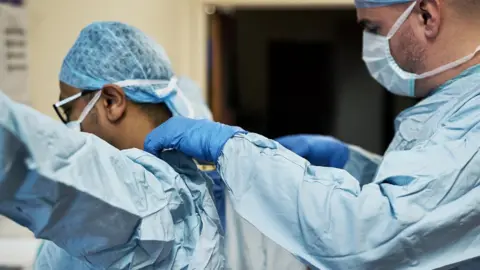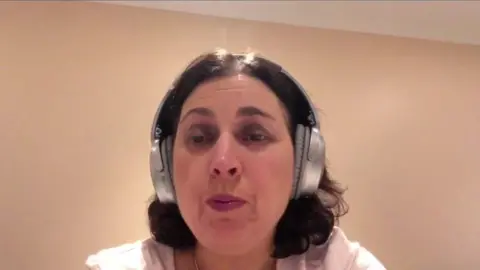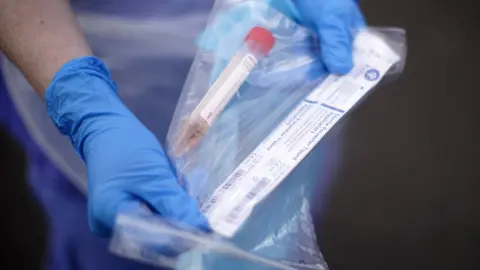Coronavirus: NHS staff 'at risk' over lack of protective gear
 Getty Images
Getty ImagesNHS staff say they are being put at risk during the coronavirus outbreak because of a lack of protective gear.
One doctor told the BBC that frontline healthcare workers felt like "cannon fodder" as they do not have access to equipment such as face masks.
Health workers also expressed concerns that not enough of them were being tested for the virus.
Prime Minister Boris Johnson said the UK had "stockpiles" of Personal Protective Equipment (PPE).
Dr Samantha Batt-Rawden, from lobbying group the Doctors' Association, said she had heard from doctors who had not got access to PPE - or it had expired or run out.
"All these doctors are worried that that's increasing their likelihood of contracting the virus and then ultimately spreading it to patients," she said.
Dr Frances Mair said her GP practice in Scotland - "like many others" - still did not have "the PPE that we require to keep us safe".
She told BBC Newsnight that they had been told they would have it by 23 March but added "that still seems late".

"Doctors and nurses and other healthcare professionals want to do the best in this pandemic and we want to look after our patients and support people who are ill but not having the correct or the best protective gear puts us and patients at risk," she said.
"It's very disheartening when you hear of colleagues talking about the way that they feel they are like cannon fodder, sent out to die."
Dr Nishant Joshi, who works in A&E at Luton and Dunstable general hospital, said he was only wearing a surgical mask to treat some patients, but not others being treated for non-coronavirus-related issues who "may still be highly infectious".
He told the BBC's Emma Barnett show: "We're fighting an invisible enemy, blindfolded, with both hands tied behind our backs and healthcare workers are at grave risk."
He compared the conditions medical staff would be working in to a warzone, saying the number of health workers who fell ill in China showed the severity of the situation.
Health workers could face more risk because they may be exposed to higher doses of the virus.
A GP from Somerset, who wanted to remain anonymous, told the BBC: "We're underprepared, under protected and under resourced. A recipe for disaster."

- EASY STEPS: How to keep safe
- A SIMPLE GUIDE: What are the symptoms?
- GETTING READY: How prepared is the UK?
- MAPS AND CHARTS: Visual guide to the outbreak
- TRAVEL PLANS: What are your rights?
- PUBLIC TRANSPORT: What's the risk?

Asked during Prime Minister's Questions about the shortage of PPE, Mr Johnson said: "Our NHS should feel that they are able to interact with patients with perfect security and protection.
"There is a massive effort going on, comparable to the effort to build enough ventilators, to ensure that we have adequate supplies of PPE equipment not just now, but throughout the outbreak."
A Department of Health and Social Care spokesman said it has "well-established procedures to deal with supply issues, should they arise".
 Getty Images
Getty ImagesLack of testing 'alarming'
Some doctors have also called for more testing for the virus among NHS workers to prevent any unnecessary absences.
Iszy Lord, 25, works at a hospital in Grimsby and lives with five other doctors - they are all self-isolating for 14 days after some of them developed symptoms.
She told the BBC: "The potential implications for self-isolating people without testing are huge.
"What's going to happen if anyone gets anything resembling a cold for the next few months, are we going to have to self-isolate for 14 days each time? It's alarming."
"The NHS is busy and overstretched. If we are tested and don't have the virus, we could be back at work in two to three days rather than two weeks."
Labour leader Jeremy Corbyn raised the issue in the House of Commons, saying current levels of 10,000 tests per day was "nowhere near even the number of people working in the NHS and the care sector".
On Wednesday, Mr Johnson announced that the UK would be increasing the number of tests per day from 10,000 to 25,000 and was "prioritising testing" for NHS staff.
However, the British Medical Association tweeted that his claim was not reflected by "the experiences of our members at the frontline of the health service and is something we are pushing to be resolved as a matter of urgency".
